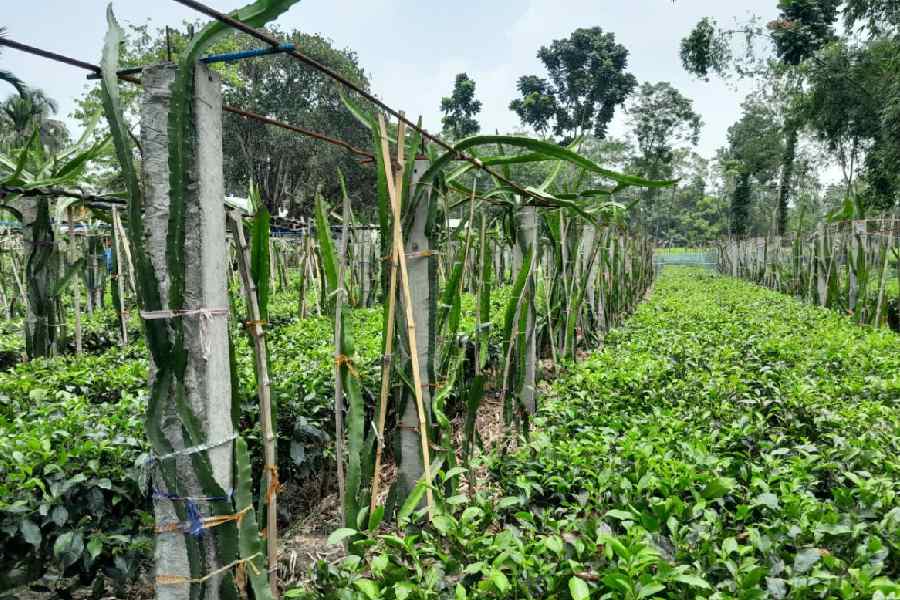
New crops power small tea growers: Dragon fruit, betel nut and pepper cultivated to cover cost of brew production
Small tea growers, who contribute to over half of the production in the state, have planted dragon fruits and betel nut trees along the edges of the gardens
 |
| Dragon fruit plants cultivated on the edge of a small tea plantation in Jalpaiguri district:The Telegraph |
Binita Paul, TT, Siliguri, 17.07.24 : The landscape of lush green small tea plantations in north Bengal is now fringed with dragon fruits and other crops.
Small tea growers, who contribute to over half of the production in the state, have planted dragon fruits and betel nut trees along the edges of the gardens. Besides, they cultivate pepper on shade trees (which are planted to provide shade to tea bushes).
Most of the small tea growers numbering around 50,000 in north Bengal are first-generation cultivators. With around 42,000 hectares of small tea gardens, the growers are beleaguered by the intermittent decline in the prices of green tea leaves they sell to bought-leaf factories (BLFs or standalone tea processing units).
"We need to spend around ₹19 to produce a kilo of tea leaves. However, there are several instances when the price drops to ₹18 or ₹15 a kilo. The low price doesn't even cover the cost of production. That is why many growers in Bengal and Assam are growing alternative crops on their plantations to make additional earnings," said Bijoygopal Chakraborty, the president of the Confederation of Indian Small Tea Growers Associations (Cista).
Chakraborty has said small tea growers in Sri Lanka don't face the problem of low price realisation, unlike their Indian counterparts. "This is because the entire tea produced in Sri Lanka is auctioned off and the price-sharing formula is implemented in a full-fledged manner," said Chakraborty.
In India, he said, around 39 per cent of tea is sold through auctions. "There is a price sharing formula but it is not fully implemented. So, we often face the crisis of lower prices," he added.
A tea expert explained what the price sharing formula is.
"To make one kilo of processed tea, 4.650 kilos of tea leaves are required. The price at which the processed tea is sold is divided between growers and BLFs at a ratio of 58:42," said a tea expert.
Prabir Seal, the former vice-chairman of the Siliguri tea auction committee and a BLF owner, said tea leaves produced by small growers were of poor quality and fetched lower prices.
"During monsoon, tea leaves become coarse and have less demand in the market. Moreover, small tea plantations cannot use pesticides during rain as they are washed away. This leads to pest attacks and the quality of tea leaves further deteriorates," said Seal.
In such a situation, the growers have found a viable option to augment their incomes by cultivating dragon fruit, pepper and betel nuts.
"All these are cash crops and have a steady demand in the market. The small tea growers thus make additional earnings," said Tapan Biswas, who is associated with the Agri Entrepreneur Growth Foundation (AEGF), an NGO that has been working for the small tea sector.
According to him, most growers cannot afford to buy a pump machine for irrigation as it costs around ₹40,000. "Even if they take a pump set on lease, the production cost goes up by around 75 per cent," added Biswas.
Shantanu Roy Laskar, a small tea grower in Jalpaiguri district, has said he has three bighas of land.
"Two bighas are used for tea cultivation and other crops are planted on the remaining land. The net annual income from one bigha of tea is around ₹20,000 whereas dragon fruits yielded an earning of around ₹40,000 in the first year of cultivation. After three years of cultivation, the income from the fruit rose to around ₹90,000,” he said.

0 Response to " New crops power small tea growers: Dragon fruit, betel nut and pepper cultivated to cover cost of brew production"
Post a Comment
Disclaimer Note:
The views expressed in the articles published here are solely those of the author and do not necessarily reflect the official policy, position, or perspective of Kalimpong News or KalimNews. Kalimpong News and KalimNews disclaim all liability for the published or posted articles, news, and information and assume no responsibility for the accuracy or validity of the content.
Kalimpong News is a non-profit online news platform managed by KalimNews and operated under the Kalimpong Press Club.
Comment Policy:
We encourage respectful and constructive discussions. Please ensure decency while commenting and register with your email ID to participate.
Note: only a member of this blog may post a comment.